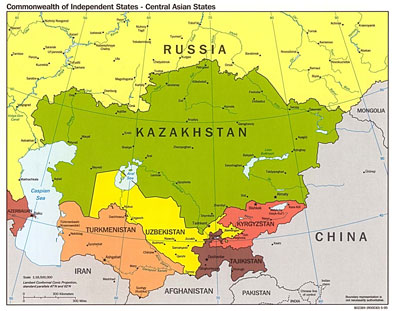 |
|
EAST
TURKISTAN INFORMATION CENTER |
|
Freedom, Independence and Democracy for East Turkistan !
|
|
INDEX: |
|
EAST TURKISTAN HISTORY |
 |
WUNN NEWSLETTER |
 |
ARCHIVES & PICTURES |
 |
HUMAN RIGHTS |
 |
WEATHER |
 |
UIGHUR MUSIC |
 |
UIGHUR ORGANIZATION |
 |
ETIC REPORT 97 - 98 - 99 |
 |
ETIC REPORT |
 |
DAILY WORLD NEWS |
 |
NATIONAL CONGRESS |
 |
REAL MEDIA FILES |
 |
CONTACT US |
 |
GUESTBOOK |
 |
|
|
|
|
| |
|
|
Uighur Press on Eastern Turkestan |
|
|
|
|
China extends
influence into Central Asia
In China has begun a multi-billion-pound scheme in
the far-Western province of Xinjiang to build
roads and railways that will open up Central Asia.
By Malcolm Moore in Shanghai
Last Updated: 8:12PM BST 17 Oct 2008

By the end of this year, nine railway lines will
be under construction, including a railway from
China to Pakistan and a rail link through
Kyrgyzstan and Uzbekistan, at a total cost of over
£50 billion.
Lines will also run east from Xinjiang into
Mongolia and onto the Qinghai plateau. Currently,
the only line linking Xinjiang with central Asia
is a 285-mile line to the Alataw Pass which
connects to Kazakhstan's rail system.
More than 1,300 miles of track will be laid in the
next decade, almost doubling the infrastructure in
the area, according to Wu Jian, the deputy head of
the railway bureau in Urumqi, the capital of the
restive Xinjiang province.
The move will connect Xinjiang to railway lines as
far off as Moscow and Tehran and a direct route is
also being planned over through the Hindu Kush
into Kabul. The move will open up Central Asia to
Chinese goods and companies, and will serve as
conduits for oil and petrol to be brought back.
Xinjiang, with almost 140 billion barrels of oil
reserves and 11 trillion cubic metres of gas, is
one of the main sources of Chinese energy. The
region is also criss-crossed with pipelines from
Russia and Kazakhstan which help to power the
eastern capitals of Beijing and Shanghai.
China is also gambling that increased trade with
its Muslim neighbours may help to calm disputes
and religious unrest within Xinjiang, which has
been a political thorn in the side of the
leadership.
Xinjiang's native Uighur population are ethnic
Muslims who have railed against Chinese rule.
Uighur pressure groups have complained that it is
Han Chinese, rather than the locals, who have most
benefited from the region's trade links and energy
wealth.
Although annual natural gas production in the
Tarim Basin has increased 20 times between 2000
and 2007, the profits have flowed eastwards. In
2005, Xinjiang's provincial government was only
given 240 million yuan (£19 million) out of the
14.8 billion yuan of tax revenue from the oil
industry.
Wang Lequan, the hardline politburo member who is
governor of Xinjiang, recently vowed to conduct a
crackdown against separatist Muslims, and banned
the observance of the Ramadan festival.
"We must always maintain a high-pressure,
strike-hard posture, adhering to a policy of
taking the offensive, striking when they show
their heads and making pre-emptive attacks," he
said, vowing to spend winter and spring conducting
a "concentrated re-education across the whole
region".
...
|
|



